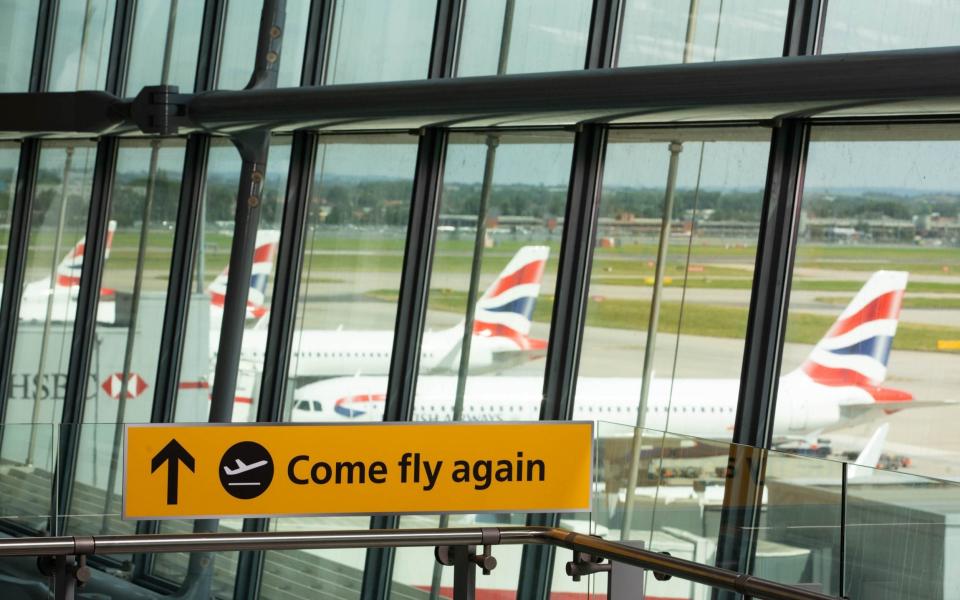Heathrow to raise passenger fees by more than half

Heathrow has been given the green light to increase passenger charges by more than half as the boss of the aviation watchdog insisted that he has not “caved in” to the overtures of the airport’s predominantly overseas owners.
The Civil Aviation Authority (CAA) is proposing to allow Heathrow’s pricing cap to increase by as much as 56pc, from £22 to between £24.50 and £34.40, over the next five years starting from summer 2022.
An interim cap of £30, a rise of more than a third, will be in place from the start of next year. The CAA is proposing that the exact figure will depend on factors such as passenger demand and commercial revenue, with prices higher if Heathrow continues to struggle in those areas.
However, the CAA stopped short of permitting Heathrow’s proposals to almost double its fees to £43.
Airlines are charged fees by Heathrow and are ultimately paid by passengers as carriers add the cost to the price of tickets.
The decision prompted a backlash among airline operators, with the former boss of British Airways calling the plans “outrageous”.
Willie Walsh, who ran British Airways owner IAG for 15 years and is now director general of airlines body Iata, said: “It is vital the CAA demonstrates it has not been gaslighted by Heathrow into accepting their outrageous demands.”
Shai Weiss, chief executive of Virgin Atlantic, warned that the proposals] “failed to protect” consumers and paved the way for Heathrow to introduce “unacceptable charges”.
Luis Gallego, chief executive of IAG added: “Heathrow is already the world's most expensive hub airport. The disproportionate increase compared to other European hubs will undermine its competitiveness even further and UK consumers will be losing out.”

But Richard Moriarty, head of the CAA, defended the regulator’s decision.
He said: “There's no way that can be characterised as caving into Heathrow.”
The CAA dismissed a plea from Heathrow’s shareholders, which include Spanish infrastructure giant Ferrovial and Chinese, Qatar and Singapore sovereign wealth funds, to recoup £2.3bn of losses suffered during the pandemic from passengers.
A spokesman for Heathrow said: “We believe the settlement should safeguard a fair return for investors.
“While it is right that the CAA protects consumers against excessive profits and waste, the settlement is not designed to shield airlines from legitimate cost increases or the impacts of fewer people travelling.”
Mr Moriarty said that Heathrow’s increased charges, which at the lower end would still be 11pc higher, reflected the fact that passenger numbers will likely remain below pandemic levels for a number of years.
He said: “We've got to strike the right balance here. There are quite a number of costs that Heathrow incurs, which are largely fixed things like heating the terminal, things like maintaining the baggage system, which don't vary depending on lower traffic level.
“And clearly, traffic's important here because it's the denominator in the calculation of the average passenger charge.”
Domestic air fares to drop
Grant Shapps has pledged to make domestic flights cheaper despite calls for Britain to follow France's lead by scrapping internal air services ahead of the Cop26 climate summit.
France outlawed domestic flights where a rail alternative exists in a bid to reduce the country’s carbon emissions earlier this year.
However, the Transport Secretary said the Government was looking at ways to make domestic services cheaper.
The air passenger duty (APD) regime, which imposes a charge of between £13 and £26 on passengers for every departure from a UK airport, means return flights are charged twice.
With Glasgow making final preparations to host the UN’s climate change gathering, Mr Shapps told an aviation conference: "We’re looking at options to reduce the effective rate of APD on domestic flights."
The aviation sector is responsible for 2.8pc of global carbon emissions. Although it is much lower than the likes of farming and road transport, many consider it discretionary rather than a necessity.
French politicians agreed to ban domestic flights where a train can complete the journey in less than two and a half hours.
Francois Pupponi, a member of the French National Assembly, said: "The environmental choice must take precedence.”
Last week passenger group the Campaign for Better Transport called on the Government to ban domestic flights where a train journey of less than five hours is available. They also opposed cuts to APD.
The UK, however, is taking a different approach, with plans to hike aviation taxes on long-haul services and reduce them on domestic flights.
Mr Shapps said a recovery in the aviation sector was not just about the return of flights to overseas destinations. “Domestic services from regional airports are equally important,” he said.
“Reconnecting our economy, and binding the Union together as we rebound from Covid.”
Ahead of Cop26, rail operators plan to start running new long-distance services to rival popular domestic air routes.
Lumo, operated by FirstGroup, will begin services between London and Edinburgh next week taking an estimated 13m journeys away from the airlines.

 Yahoo Finance
Yahoo Finance 